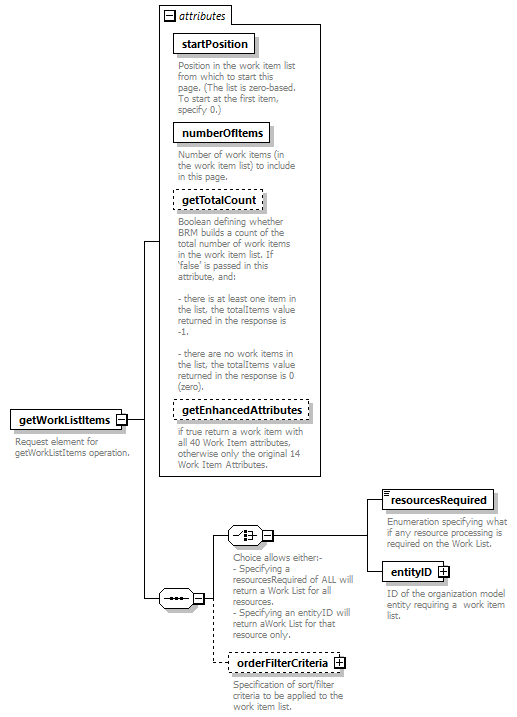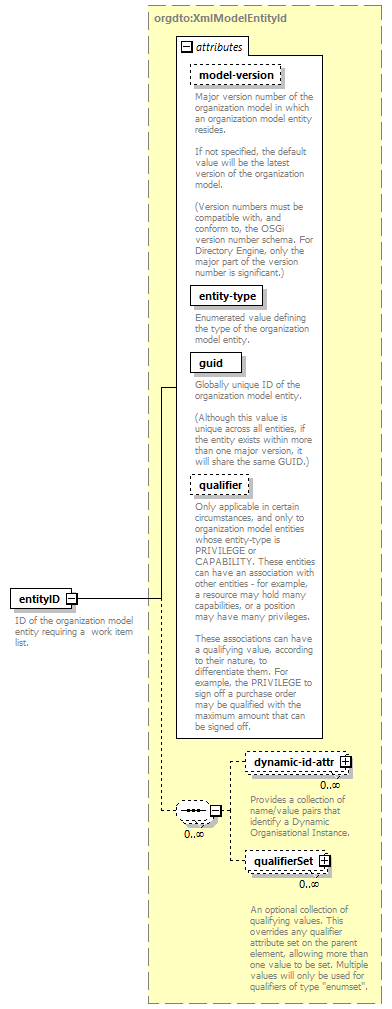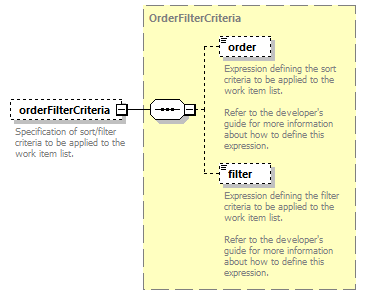| diagram |  |
||||||||||||||||||||||||||||||||||||||
| namespace | http://api.brm.n2.tibco.com | ||||||||||||||||||||||||||||||||||||||
| properties |
|
||||||||||||||||||||||||||||||||||||||
| children | resourcesRequired entityID orderFilterCriteria | ||||||||||||||||||||||||||||||||||||||
| attributes |
|
||||||||||||||||||||||||||||||||||||||
| annotation |
|
||||||||||||||||||||||||||||||||||||||
| source | <xs:element name="getWorkListItems"> <xs:annotation> <xs:documentation>Request element for getWorkListItems operation.</xs:documentation> </xs:annotation> <xs:complexType> <xs:sequence> <xs:choice> <xs:annotation> <xs:documentation>Choice allows either:- - Specifying a resourcesRequired of ALL will return a Work List for all resources. - Specifying an entityID will return aWork List for that resource only.</xs:documentation> </xs:annotation> <xs:element name="resourcesRequired" type="ResourcesRequiredType"> <xs:annotation> <xs:documentation>Enumeration specifying what if any resource processing is required on the Work List.</xs:documentation> </xs:annotation> </xs:element> <xs:element name="entityID" type="orgdto:XmlModelEntityId"> <xs:annotation> <xs:documentation>ID of the organization model entity requiring a work item list.</xs:documentation> </xs:annotation> </xs:element> </xs:choice> <xs:element name="orderFilterCriteria" type="OrderFilterCriteria" minOccurs="0"> <xs:annotation> <xs:documentation>Specification of sort/filter criteria to be applied to the work item list.</xs:documentation> </xs:annotation> </xs:element> </xs:sequence> <xs:attribute name="startPosition" type="xs:long" use="required"> <xs:annotation> <xs:documentation>Position in the work item list from which to start this page. (The list is zero-based. To start at the first item, specify 0.)</xs:documentation> </xs:annotation> </xs:attribute> <xs:attribute name="numberOfItems" type="xs:long" use="required"> <xs:annotation> <xs:documentation>Number of work items (in the work item list) to include in this page.</xs:documentation> </xs:annotation> </xs:attribute> <xs:attribute name="getTotalCount" type="xs:boolean" use="optional" default="true"> <xs:annotation> <xs:documentation>Boolean defining whether BRM builds a count of the total number of work items in the work item list. If ‘false’ is passed in this attribute, and: - there is at least one item in the list, the totalItems value returned in the response is -1. - there are no work items in the list, the totalItems value returned in the response is 0 (zero).</xs:documentation> </xs:annotation> </xs:attribute> <xs:attribute name="getEnhancedAttributes" type="xs:boolean"> <xs:annotation> <xs:documentation>if true return a work item with all 40 Work Item attributes, otherwise only the original 14 Work Item Attributes.</xs:documentation> </xs:annotation> </xs:attribute> </xs:complexType> </xs:element> |
attribute getWorkListItems/@startPosition
| type | xs:long | ||
| properties |
|
||
| annotation |
|
||
| source | <xs:attribute name="startPosition" type="xs:long" use="required"> <xs:annotation> <xs:documentation>Position in the work item list from which to start this page. (The list is zero-based. To start at the first item, specify 0.)</xs:documentation> </xs:annotation> </xs:attribute> |
attribute getWorkListItems/@numberOfItems
| type | xs:long | ||
| properties |
|
||
| annotation |
|
||
| source | <xs:attribute name="numberOfItems" type="xs:long" use="required"> <xs:annotation> <xs:documentation>Number of work items (in the work item list) to include in this page.</xs:documentation> </xs:annotation> </xs:attribute> |
attribute getWorkListItems/@getTotalCount
| type | xs:boolean | ||||
| properties |
|
||||
| annotation |
|
||||
| source | <xs:attribute name="getTotalCount" type="xs:boolean" use="optional" default="true"> <xs:annotation> <xs:documentation>Boolean defining whether BRM builds a count of the total number of work items in the work item list. If ‘false’ is passed in this attribute, and: - there is at least one item in the list, the totalItems value returned in the response is -1. - there are no work items in the list, the totalItems value returned in the response is 0 (zero).</xs:documentation> </xs:annotation> </xs:attribute> |
attribute getWorkListItems/@getEnhancedAttributes
| type | xs:boolean | ||
| annotation |
|
||
| source | <xs:attribute name="getEnhancedAttributes" type="xs:boolean"> <xs:annotation> <xs:documentation>if true return a work item with all 40 Work Item attributes, otherwise only the original 14 Work Item Attributes.</xs:documentation> </xs:annotation> </xs:attribute> |
element getWorkListItems/resourcesRequired
| diagram |  |
|||||||||
| type | ResourcesRequiredType | |||||||||
| properties |
|
|||||||||
| facets |
|
|||||||||
| annotation |
|
|||||||||
| source | <xs:element name="resourcesRequired" type="ResourcesRequiredType"> <xs:annotation> <xs:documentation>Enumeration specifying what if any resource processing is required on the Work List.</xs:documentation> </xs:annotation> </xs:element> |
element getWorkListItems/entityID
| diagram |  |
||||||||||||||||||||||||||||||||||||||
| type | XmlModelEntityId | ||||||||||||||||||||||||||||||||||||||
| properties |
|
||||||||||||||||||||||||||||||||||||||
| children | dynamic-id-attr qualifierSet | ||||||||||||||||||||||||||||||||||||||
| attributes |
|
||||||||||||||||||||||||||||||||||||||
| annotation |
|
||||||||||||||||||||||||||||||||||||||
| source | <xs:element name="entityID" type="orgdto:XmlModelEntityId"> <xs:annotation> <xs:documentation>ID of the organization model entity requiring a work item list.</xs:documentation> </xs:annotation> </xs:element> |
element getWorkListItems/orderFilterCriteria
| diagram |  |
||||||
| type | OrderFilterCriteria | ||||||
| properties |
|
||||||
| children | order filter | ||||||
| annotation |
|
||||||
| source | <xs:element name="orderFilterCriteria" type="OrderFilterCriteria" minOccurs="0"> <xs:annotation> <xs:documentation>Specification of sort/filter criteria to be applied to the work item list.</xs:documentation> </xs:annotation> </xs:element> |
WSDL documentation generated by XMLSpy WSDL Editor http://www.altova.com/xmlspy